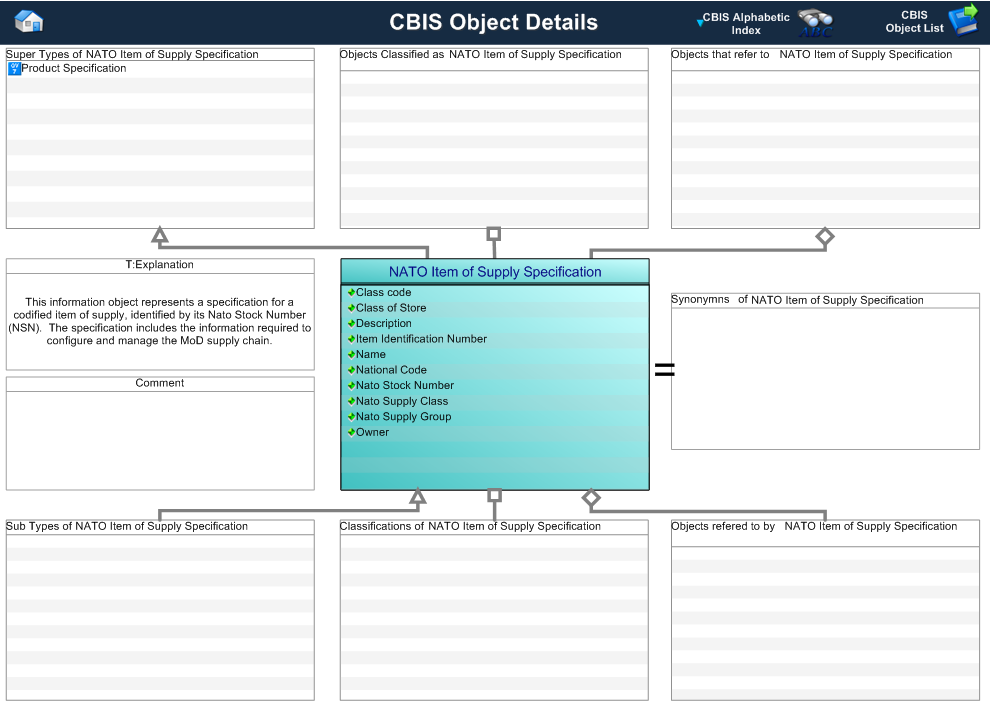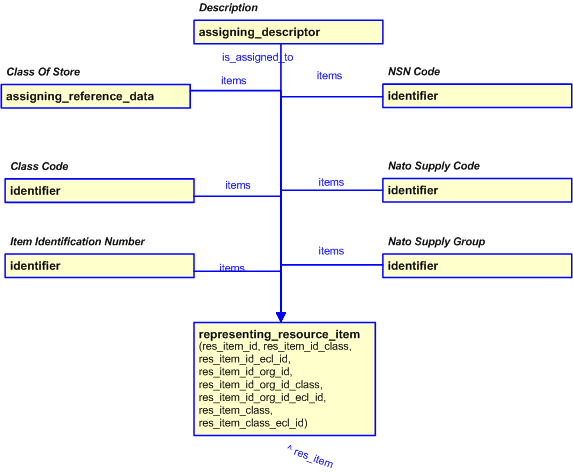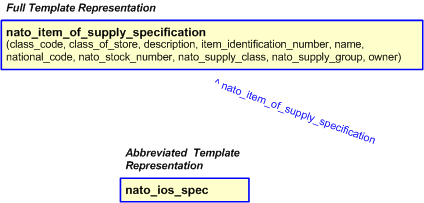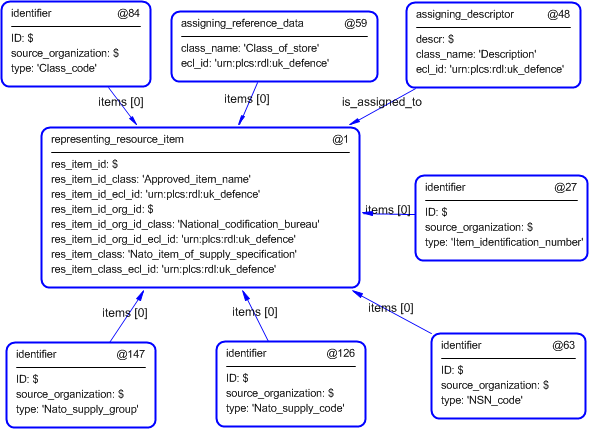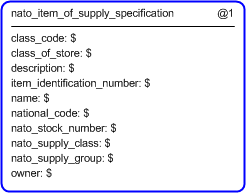Template:— nato_item_of_supply_specification (nato_ios_spec)
Context:— UK_Defence |
Date: 2010/03/18 11:53:42
Revision: 1.5
|
This section specifies the template nato_item_of_supply_specification.
NOTE
The template has been defined in the context of
UK_Defence.
Refer to the business context for details of related templates.
NOTE
An explanation of a template and the associated instantiation path is
provided in the
Template overview
section.
This template describes how to represent a specification for a codified item of supply, identified by its Nato Stock Number
(NSN).
This information object represents a specification for a codified item of supply, identified by its Nato Stock Number (NSN).
The specification includes the information required to configure and manage the MoD supply chain.
This information object is represented using a object diagram and table of attribute definitions below. It represents a specification
for a codified item of supply, identified by its Nato Stock Number (NSN). The specification includes the information required
to configure and manage the MoD supply chain.
Figure 1 — Graphical Representation for Business Object Nato Item of Supply Specification
|
Attribute name
|
Attribute description
|
Attribute type
|
Optionality
|
| Class code |
This is the Class Code (CC), part of the Nato Stock Number. |
Intrinsic |
Mandatory |
| Class of Store |
This identifies the class of the storage for this item of supply. |
Intrinsic |
Mandatory |
| Description |
This is the description of the item of supply. |
Intrinsic |
Mandatory |
| Item Identification Number |
This is the Item Identification Number (IIN), part of the Nato Stock Number |
Intrinsic |
Mandatory |
| Name |
This is the name of the item of supply specification. |
Intrinsic |
Mandatory |
| National Code |
This is the Nation Code (NC), part of the Nato Stock Number. |
Intrinsic |
Mandatory |
| Nato Stock Number |
This is the concatenated string representation of the Nato stock number of the item of supply. |
Intrinsic |
Mandatory |
| Nato Supply Class |
This is the Nato Supply Class (NSC), part of the Nato stock Number. |
Intrinsic |
Mandatory |
| Nato Supply Group |
This parameter identifies the NATO supply group (NSG) code for the item of supply. |
Intrinsic |
Mandatory |
| Owner |
This is specifies the owner of the item of supply specification. |
Intrinsic |
Mandatory |
Table 1 — Nato Item of Supply Specification attribute details
The EXPRESS-G diagram in
Figure
2
shows the templates and EXPRESS entities that are required
to represent the template
"nato_item_of_supply_specification".
The text highlighted in blue shows the template parameters.
Figure 2 — An EXPRESS-G representation of the Information model for nato_item_of_supply_specification
The graphic for the template to be used in other EXPRESS-G diagrams
is shown in Figure
3
below.
Figure 3 — The graphical representation of the nato_item_of_supply_specification template
The following input parameters are defined for this template:
This is the Class Code (CC), part of the Nato Stock Number. This parameter identifies the first 4 digits of the NSN.
This identifies the class of the storage for this item of supply.
The following classes and their sub-classes can be used:
classifications: [Class_of_store]![[warning:]](../../../../../../images/dex/warning.gif) Error RDL4: The URI urn:plcs:rdl:uk_defence is not listed in dexlib/data/refdata/rdl_index.xml
Error RDL4: The URI urn:plcs:rdl:uk_defence is not listed in dexlib/data/refdata/rdl_index.xml
This is a description of the item of supply.
This parameter identifies the Item identification number (IIN) component the NSN .
This is the name of the item of supply.
This is the Nation Code (NC), part of the Nato Stock Number (5th and 6th digits).
This is the 13 digit concatenated string representation of the Nato stock number of the item of supply.
This is the Nato Supply Class (NSC), part of the Nato stock Number, (3rd and 4th digits).
This parameter identifies the NATO supply group (NSG) code for the item of supply (the 1st two digits).
This is specifies the owner of the item of supply specification.
The following reference parameters are defined for this template:
Allow the
Resource_item
entity instantiated in this path to be referenced when this template is used.
Note: The
Resource_item
entity can be referenced in a template path by:
%^target = $nato_item_of_supply_specification.nato_item_of_supply_specification%
where
target
is the parameter to which the
Resource_item
is bound.
The instantiation path shown below specifies the entities that are to be
instantiated by the template.
A description of templates and the syntax for the instantiation path is
provided in the
Templates Help/Information section.
-- create the resource item for the Nato IOS spec /
representing_resource_item(
res_item_id=@name,
res_item_id_class='Approved_item_name',
res_item_id_ecl_id='urn:plcs:rdl:uk_defence',
res_item_id_org_id=@owner,
res_item_id_org_id_class='National_codification_bureau',
res_item_id_org_id_ecl_id='urn:plcs:rdl:uk_defence')/
%^nato_item_of_supply_specification = $representing_resource_item.res_item%
-- Classification of the resource item (nioss) /
assigning_reference_data(
class_name='Nato_item_of_supply_specification',
ecl_id='urn:plcs:rdl:uk_defence',
items=^nato_item_of_supply_specification)/
-- Class_code /
identifier(
ID=@class_code,
source_organization=@owner,
type='Class_code',
items=^nato_item_of_supply_specification)/
-- Class_of_store /
assigning_reference_data(
class_name=@class_of_store,
ecl_id='urn:plcs:rdl:uk_defence',
items=^nato_item_of_supply_specification)/
-- Description /
assigning_descriptor(
descr=@description,
class_name='Description',
ecl_id='urn:plcs:rdl:uk_defence',
is_assigned_to=^nato_item_of_supply_specification)/
-- Item_identification_number /
identifier(
ID=@item_identification_number,
source_organization=@owner,
type='Item_identification_number',
items=^nato_item_of_supply_specification)/
-- Name /
identifier(
ID=@nato_stock_number,
source_organization=@owner,
type='NSN_code',
items=^nato_item_of_supply_specification)/
-- National_code /
identifier(
ID=@national_code,
source_organization=@owner,
type='Ncb_code',
items=^nato_item_of_supply_specification)/
-- Nato_supply_class /
identifier(
ID=@nato_supply_class,
source_organization=@owner,
type='Nato_supply_class',
items=^nato_item_of_supply_specification)/
-- Nato_supply_group /
identifier(
ID=@nato_supply_group,
source_organization=@owner,
type='Nato_supply_group',
items=^nato_item_of_supply_specification)/
The instance diagram in Figure
4
shows an example of the EXPRESS entities and templates that are instantiated by the template:
/nato_item_of_supply_specification(class_code='', class_of_store='', description='', item_identification_number='', name='', nato_stock_number='', national_code='', nato_supply_class='', nato_supply_group='', owner='')/
(an illustration of the consolidated nato_item_of_supply_specification template is shown in
Figure
5 below.)
Figure 4 — Entities instantiated by nato_item_of_supply_specification template
The instance diagram in
Figure
5
shows the graphic symbol for the template that is to be
used in other instance diagrams. The example template is:
/nato_item_of_supply_specification(class_code='', class_of_store='', description='', item_identification_number='', name='', nato_stock_number='', national_code='', nato_supply_class='', nato_supply_group='', owner='')/
Figure 5 — Instantiation of nato_item_of_supply_specification template
Characterizations
No common characterizations of the template
nato_item_of_supply_specification
have been identified. However, the ISO 10303-239 EXPRESS model
may enable other assignments to the entities instantiated by the template.
